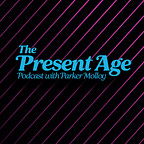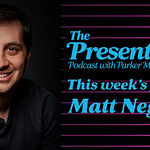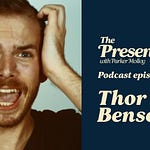Parker Molloy: Joining me this week is Pete Croatto. Hey Pete.
Pete Croatto: Hey Parker. How are you?
I'm doing okay. I'm hanging in there. I'm surviving. It's becoming fall. It's getting cold outside. I love it.
Me too.
It's rainy right now. It's fine.
Matches my mood. I love it.
So you wrote a book about the NBA and how it became so entwined with pop culture. Can you tell me a little bit about your background and your book?
Certainly. Yeah, I mean, I don't know if I'd consider myself to be a sports writer. I mean, I've written about sports for years and for Slam and the old good Deadspin and Grantland and various outlets. But I've always been driven kind of by my curiosity about certain topics and yeah, and that's kind of kept me afloat, but I've never really been a beat reporter or a sports reporter. And I'm pursued by my curiosity more than anything.
So about eight years ago... Wow, it seems like a long time ago, I wrote a piece for Grantland on Marvin Gaye's National Anthem at the 1983 NBA All-Star Game. And that piece was about... I interviewed 25 people and it was 2,500 words and it was a piece I'm very proud of and it's still on the Grantland site. But in writing and reporting that story, there were just a lot of unanswered questions. And the one thing that I kept going back to was how did the NBA get to a moment where Marvin Gaye went from being this scandalous choice, who does this rendition of a national Anthem that is soulful and R&B flavored and really is unlike anything anyone has ever heard before, where that becomes normal, where that becomes like where someone like Fergie singing the National Anthem is normal or...
How did the NBA become the cool sport? That whole point in the market transition between the old stodgy NBA and the NBA that we see today. And I couldn't really explore that in a 2,500-word piece. And I kind of became convinced that this was a book. So through several years later and a lot of false starts and a lot of questionable decisions on my end, I wrote this book. But yeah, never really been a sports writer. I've been a freelance writer for 15 years now. I started off in newspapers and just by happenstance and good fortune, I got into sports writing.
Well, that's cool. Yeah. I mean, I really liked your book because it- It really took this... Which, up until I've moved a few months back I had it next to my desk, but now I don't. It's a good book it's called From... I don't want to get it backwards. From Hang Time to Prime Time, right?
There you go. Yeah.
Yes. From Prime Time to Hang Time, to whatever time to... Yeah.
The orange book. That's what I call it.
It’s the orange book with the TV head and the dunking. I'll be sure on the transcript of this to include a photo of the book cover so people will know what the hell I'm talking about. But yeah. The book is filled with a ton of really interesting stories and it's something that I kind of thought about, but haven't necessarily put in much research trying to look some of the stuff up. Because I mean, I remember it was just... I mean, it seems like it was just a few years ago, but it's possible it was longer, where players would be fined for not wearing the proper attire to the pre-game stuff. It was very uptight and fairly recently, and now it seems like it's gotten to this point where the players have really taken it upon themselves to express themselves and to kind of ease out of that sort of era. What do you attribute to that?
That's a good question. I think a lot of it has to do with the fact that if you look at the NBA's demographics now, it's mostly African American. And I think as time has gone on hip hop culture has really become mainstream more so. With each year that passes by, it becomes more and more ingrained into the culture. And that's really what you see now is you see things that would've been, again, dismissed 15, 16 years ago are now just sort of... It's normal. It's the way things are. I mean, it takes a long time for things to become embraced into the culture. And I think what you're seeing now, again with the whole fashion element of the NBA becoming a very hip hop league, a league that isn't very suit and tie like the NFL. That I think that's a very much a reflection of who's in the league and also how the culture's changed.
You made a good point just now with the dress code. I really think that had everything to do with David Stern being the NBA Commissioner at the time. And David Stern is a key figure in this book, but at the time of the dress code ban, I think he was in his mid sixties, early sixties. And he was at a time in his life, like a lot of people where you get older and you don't understand things. And when you don't understand your first reaction is to chastise or to ban, or to make a rule, instead of asking questions and understanding what the intentions are. To me, David Stern's failings as a commissioner kind of came to light as he got older. And he got older and the players kind of stayed the same age, they're all still men in their twenties and thirties for the most part and younger as the NBA draft became more about getting high school kids in there.
Yeah. Definitely. For some reason when you said that, the first thing that popped into my head was David Stern doing Matthew McConaughey's line from Dazed and Confused. He's getting older, they stay the same.
Yeah. I'm not going to even adventure to do impression of David Stern doing Matthew McConaughey in Dazed and Confused. I have so much collateral as a public person. I'm going to make sure to stop right there.
Yeah. You don't want to become known as the guy trying to do David Stern as McConaughey.
No, nobody wants that.
But yeah, I mean, so one thing that I do is I... A few years ago I started to get into video games again. Because that's the thing, whenever the world gets crazier, I pick up a hobby that seems to be from my childhood. I was just showing you earlier. Baseball cards, that's my new one. Picking up baseball cards. So a few years back, I just kind of on a whim was like, "I'm going to buy a Nintendo Switch because that way I can play games" because I was playing a lot of games on my phone and what would happen is I'd get popups that were always terrifying. It was always like, "Hey, Trump just did this crazy thing." And it was like, "oh no, that is not relaxing. I can't relax when I'm holding this thing that constantly tells me what's happening in the world."
I bought a Switch. And then from the Switch, I ended up getting a PlayStation. And once I had the PlayStation, I started buying all the sports games as they came in. Madden and MLB: The Show and NBA 2K, that series. And so in the latest one, latest NBA 2K game, which came out just, I don't know, like a month or two ago. It's really interesting how the cultural elements plays into the whole thing. If you do the MyCareer mode. Yeah. There's this thing where you can do certain things and get points toward becoming a music mogul. Or you can do something else and, and start your own fashion line.
And it's really interesting how much non-basketball stuff plays into it. But it seems to work. I mean, a while back, I was tweeting about playing it where I'm like, "there is basketball in this game at some point." But the player that you are in the MyCareer mode, it's like a guy who made videos and he's a YouTube star and now he's basketball star. It doesn't make a whole lot of sense because it's not actually a path to the NBA that you actually seem to take, but it's a lot of fun. And I thought that it was really interesting to see how that kind of worked in. One thing I have been thinking about, which is also kind of represented in the game in the sense that there are a lot of, really not so subtle, advertisements built into that like the dude who plays Jake from State Farm.
I saw that. That was crazy.
He's in the game. And he shows up several times. At one point he's in your apartment. You come back from a game and he's like at your table. It's weird. It's very strange.
Do you think any player in any sport wants to hang out with Jake from State Farm
Probably not.
I can't imagine anybody like Russell Westbrook or Aaron Rodgers actually wanting to spend their spare time with Jake from State Farm.
Yeah. So he's in there, but then I thought, "Oh man, that's not really subtle," but that reminded me of how now on the uniforms for the past few seasons, there have been all these ads. What are your thoughts on the advertisements on the uniforms? I'm not a fan. And I mean, I feel like it'd be weird to be like, "yes, I love this," but how much?

See, I'm not a giant fan of them, but I understand why the NBA does it. And what you mentioned before about this whole... The marketing being folded into NBA 2K, which is delightfully absent from the NBA Jam console arcade game that my family got me, that's what the NBA's always done. The NBA has always had an alliance, sometimes an uncomfortable alliance with his advertisers and it's been this way forever, starting back to. I mean, how many leagues have advertisements for their own product? The NBA action, it's fantastic. So that has been baked into the NBA for years. So the logos don't really bother me. I don't like them aesthetically, but to me, this is what the NBA's always been about.
One of the guys I spoke to for the book, Joe Cohen, who founded MSG Network, he delivered the quote, which I think explains everything about the NBA and why we're able to roll with the punches as well as we do. He said that the NBA's tradition is that it has no tradition. So all these things that you see with the video games and the patches, and even the advertisements on the floor, have you noticed this, where it kind of switches over every quarter? Those things seem weird and kind of Orwellian, if I hope I'm using that term correctly, but they-
Well, no one else is, so.
I'm going to hop on. It all seems doomed because the NBA has always been about never staying still. I'm curious to hear your thoughts of this, because the one uniform thing that bugs me to death is the whole home and away concept, now. Teams don't seem to wear a light color for home or dark color for away, now it's reversed. And it takes me five minutes to figure out who the hell's playing who. Is this in Phoenix or LA? I don't know. That annoys me more than the patches, but the patches, it's a bit much. But the NBA is in it to make money and that's what they do year after year after year.
Yeah. I mean, I was glad to hear that there was a tweet earlier, right before the season started, from the Bulls that were like "white uniforms are back at home" and it's like, "Finally. Finally."
It's a relief, isn't it?
Because yeah. It was weird, because, I mean, growing up in and around Chicago, the Bulls were everything to me, especially in the nineties.
Oh God. Yeah.
I was 14, 15 years old. And Michael Jordan doing all that stuff. It was great. It was wonderful. And yeah, I was like "the red uniform is better, but white at home." And it was just sort of tradition that kind of kept going on. In other sports they have their traditions. Football, darker colors home and white away, which I think is kind of... Really makes sense in the sense that you've got the away team all muddy and...
Yeah, I love it.
They look like they've taken a beating, which is kind of I think somewhat of the idea behind that. And then there've always been exceptions like the Dallas Cowboys would always wear white at home and white on the road. So almost always white. But yeah, it's been interesting to see the uniform sort of flip around like that. I mean, I'm a big fan of the interesting and kind of out there throwbacks and remixes and all of that stuff. I mean, some of them are better than others. What are your thoughts on those?
And there's a lot of thought because in the few moments that I have to myself, my mind kind of goes in these weird directions and I'm of the belief that there hasn't been a great uniform in any major sport that has been created past 1985. I mean, if you look at the classic NBA uniforms and even NFL, Major League Baseball, the four major sports, I can't think of a... I am hard-pressed to think of a great uniform that came out after 1985. So I love seeing the throwbacks. I love seeing in any sport. I mean, there are some exceptions that are horrible. I remember the Eagles a few years back had that horrible blue and yellow combination. And the Steelers had one that where they looked like barber poles with black... Or bumblebees.
But for the most part, I love throwbacks. And the thing too with throwbacks is that for all these leagues, it's a money maker because you can now sell like all this stuff online or at Mitchell & Ness. And everyone comes to go about that happy. But with the NBA, every time they unveil a new uniform, especially those ones that were, was it the city uniforms that came out? I just cringe. I love the classic seventies, eighties, even early nineties uniforms. And those Bulls' uniforms are a good example. They're classic.
Yeah. Yeah. I mean, that's the thing, that Bulls can't really change them because not much has changed about their uniforms over the years. I mean, they've had some differences, they introduced the black uniforms in the nineties. That was one. The black-
Those I like.
The red stripes.
I liked those pinstripes. Yeah. Those are cool.
Those were cool. And then they replaced those with an all-black that didn't have the pinstripes, which is fine. My favorite uniform growing up, I mean, was always the Sonics' uniform. The green with the white stripes across. It just said Sonics.
Love those uniforms.
Those were my favorite. And I was very disappointed when they updated those in, I think it was, '95 or '96.
So you're more disappointed about the uniforms being updated. Were you more upset about the uniforms being updated or the Sonics being stolen from Seattle? Is it a toss-up?
It's a little of both because it's like... I don't know. The Oklahoma City Thunder? Come on. That's...
And those are terrible uniforms.
Yes.
I don't know. The Sonics' uniforms in the seventies are great. Those are great uniforms. The Bucks' uniforms in the seventies with sort of their kelly green with red, they're gorgeous. I don't know. I'm trying to think of a uniform from like... You know who has good uniforms now in the NBA? I think the Warriors have really good uniforms. I think they're clean. The logo pops. The color scheme is great. It's a beautiful uniform. But yeah, most uniforms now, I look at them and it just looks like, I don't know, it looks like something a middle-age dad would wear to a picnic. And not the cool middle-aged dad, but the dad who's maybe been divorced, trying to find their way, they pick up this cool tank top at, I don't know, Kohl's or another gentleman's store. And it is just not a good fit.
But look, I'm very different. I'm not the market for the NBA. I'm a 44-year-old white dude. The NBA's not looking for my dollars. So I don't think Adam Silver or anybody else in Olympic Tower is going to be returning my phone calls about the uniform. So.
Yeah. I have suggestions, just screaming those out there. I remember in the nineties, there were a lot of really drastic shifts in uniforms. Especially mid, late-nineties, the Rockets adopted that—
Awful.
Weird blue with 3D silver.
Awful. It was awful. Awful.
It was a mess. You had the Detroit Pistons, that was one that was a big change.
Yeah. There-
I didn't hate it, but it was just so different that you-
It was very different.

Where did this come from?
And I think I remember reading somewhere, and I could be wrong about this, but I think all those designs that you saw and there are only a... And look, a few of the teams kind of stuck to the traditional ways of having their uniforms, the Lakers, the Celtics, the Knicks to a certain extent. I remember reading this and I could be wrong, but around 1996, which is when the shift started to happen, there was sort of a movement to make the logos more kid-friendly and to make it more eye-popping. So again, that meant that 85% of the teams, the logos, and the jerseys got bigger and bolder and more colorful, and they weren't as subdued as past, but the Rockets' one was awful.
So the Rockets on the box was another example. The Jazz with that airbrushed mountains, which looks like the fun of an off-brand Seltzer company. It became, again, geared toward the kids. It's funny, in perusing Twitter, which is never a good idea.
No.
No. As you know better than anybody. Perusing Twitter, you do see a lot of older NBA fans, which I think is great, but the thing is those fans are going to stay no matter what, like "I'm going to be an NBA fan, regardless of who's wearing what." But again, the entry point, I think the uniforms and the logos and the court design stuff, those are sort of gateway drugs to get casual fans involved because like, "I'm not going anywhere." So, if the Bucks want to actually put on deer uniforms in two years and play, they can do that and get away with as long as the game doesn't fundamentally change. So yeah.
Yeah, that's good. That's a great point. I mean, and really interesting. I guess I hadn't really thought about the fact that it was kind of more kid-friendly. I was just like, "it's really in your face." It was like-
It really is. Yeah.
It was like the Mountain Dew generation.
That's a good point though. Those logos and those uniform designs, let's say from like '98 to 2004, 2005, they could go on an energy drink can.
Yeah. Oh, absolutely.
The colors are the same. The logo. And again, if you're a traditionalist who grew up with Dolph Schayes and two-handed set shots, that angers you because it's unfamiliar and it's ridiculous. But if you're someone who grew up in that era, in the eighties and nineties where it's like, "well, every year there's something different." Like, "it's all right." It's the same old stuff. It's the same. Change becomes consistency. When you get used to that, it's golden.
Yeah. Definitely. One non-uniform thing I wanted to ask you about, which— Actually, one more point on uniforms. My favorite uniforms of all time are actually not an NBA team's uniform, but my favorite basketball uniforms of all time, it's a two-way tie both from the year 1996. You've got the Olympic uniforms, which I love them.

Those are good. Those are with the cursive USA.
Yeah.
Those are nice.
And I love the font that they use for the numbers.
That's a good one.
And also the 1996 All-Star uniforms, the...teal. It was when they were playing, I think it was in San Antonio. So it used to all be like-
Oh, God. Yes.
Be like... The... teal and the pink and the orange were the alternate colors down in this first list.
See, those uniforms are so bad they're good. They go around. Those uniform... Yeah. I think Mitchell & Ness now sells them. But they look like they're playing for a Mexican food league.
I guess. Kind of.
But that's the appeal. But that just goes to show you too, if baseball did that, the shit would just be nonstop about like, "you're denigrating the game," but the NBA can deck their teams out in uniforms where it looks like team Taco Bell playing against like [inaudible]. It didn't really bother anybody. It was like, "that's odd."
It was fun, it was different.
But then we went about our business. And that's kind of the whole NBA right there. Again there's going to be stuff, but if you get to see Michael Jordan play who cares? And I'm sure that— that was the Jordan All-Star Game '96. So yeah, I'm sure. So you weren't caring about what he was wearing, right? It was just, he's Michael Jordan, that's all that matters.
Exactly. And yeah.
I have to ask you, do you have either one of those jerseys?
I have the USA one. It's a Shaquille O'Neal jersey — number 13.
Right. He was 13. Okay.
Yeah. Two years ago, actually, I went back to my parents' place to kind of just rummage through their basement for a little bit. And one of the things I did was I was picking on all the old NBA jerseys, those old Champion jerseys and-
I love those jerseys.
Yeah. Those are always great. The one thing that always bothered me was that they would never be accurate, the Sonics' jersey didn't have the white stripe across the front. It just said Sonics. And it's like, "What is going on? Why don't you look good? How are you?" It made me want to shell out the money to get the actual replica jerseys. But then again, I was like 10 years old, so I didn't have any money at the time.
So you didn't have $300 to put down on a Kendall Gill Sonics Jersey. You didn't have—
Exactly. It was Shawn Kemp that was that- That was the one who was close to my heart. His dunks were amazing.
The embarrassing jerseys that I have. Every once in a while, I'd go to outlet malls and I would just sort of buy whatever was around when I was a kid. The one Jersey that I have that I think is probably... I wish I had kept it because I think it was just so... Again, it was like the All-Star Game jersey for 96, so bad it was good. I actually spent like 20 bucks and I got a Sean Bradley, 76ers jersey with the 76 on the back. And I wore it playing pickup. And I was terrible. When you're playing pickup, you should never wear jerseys, I just think you always look like a chump.
So that went right back into the drawer. I wish I had kept that though because that's one of those classic hipster jerseys. And I had a Tim Hardaway Jersey that I got rid of. Yeah. I had a few of them, but Sean Bradley is probably my prize in terms of get a load of this.
Yeah. Yeah, definitely. Always fun to kind of keep up with the jerseys. But yeah. So anyway, so the one thing I wanted to ask you about was that, in the course of your reporting because... How many people did you interview for this book?
Oh man. 350 for the original interview. And then you throw in the ones from previous reporting, it probably adds up to about 350, 360 total.
So who was the most interesting interview you had and what was something that, before you started writing the book, you didn't know, that you learned and surprised you, that you found interesting in the course of reporting it out?
I'll answer the second question first if you don't mind because it's always easy to come with that answer. I mean, I feel like I learned something every day. That was the joy of writing this book. And also the joy of just reporting anything is you get paid to learn and you get paid to, expand your horizons and get some perspective. So, I mean, every day I would go to my wife and be like, "Hey, you're not going to believe this. David Stern actually toured MLB studios to kind of get ideas for NBA entertainment." And after a while, my wife tuned me out and got back to reading her book.
I feel like every day I was learning something. And every day there was another nugget I wanted to include, another nugget I felt I had to get in. But the thing that I think really stuck out in the reporting was just how important Larry O'Brien, the original commissioner was to the NBA's ascension. And that's for two reasons. The first reason was that at the time Larry O'Brien was a major political player. He was a two-time head of the Democratic National Committee. He was a member of JFK's inner circle. He was LBJs Postmaster General. So when the NBA hired him in '75, it was almost like a step down for him. I mean, now, if you're the commissioner, that's the summit. That is a career highlight. But for Larry O'Brien, it was a step down.
But with Larry O'Brien, his hiring gave the NBA instant credibility, which is what it needed. The other thing too with Larry O'Brien was that he hired David Stern to work full-time. And he basically had David Stern be his right hand man saying, "Hey, look, I don't want..." Basically, Larry O'Brien was more of a figurehead. He was somebody who was just sort of there to keep things moving along. But David stern did all the dirty work. So by Larry O'Brien getting David stern out there to work with the GMs, talk to the labor people, talk to the owners, by time Larry O'Brien retires in 1984, David stern has a five year head start on the job. And on top of that he not only has that, but he has free rein to do whatever he wants. It was just a perfect setup, kind of like in baseball where the setup man leaves right into the... Is closer. That's really what it was with O'Brien and Stern.

In terms of the most interesting person I spoke to. That's the thing, there weren't a lot of duds. It's funny, when you talk to them, many people think, "Oh, well, this guy's an asshole or this person, does he have anything interesting to say?" But really, 95% of the people I spoke to were just great and they had amazing revelations. But the person who I thought was most interesting was a guy by the name Mark [inaudible 00:29:53], who was a former Nike executive, because to me, he had insights into Nike's dealings with the NBA and how they kind of brought Michael Jordan to the forefront and how they turned him into this sort of commercial property that I didn't know. I mean, I thought were just invaluable.
But yeah. I mean, that's the thing. It's so hard for me to say, "Well, this person was by far the best person or the most interesting person," because when you talk to all these people who spent years, either working for the NBA or working for the NBA. And a lot of these people were in their thirties or twenties, a formative time in their lives. They're going to have interesting stories. They're going to have amazing memories. So really talking to just about anybody for this book was just a treat. And it was an honor to have them share a part of their lives with me, because it was a big part of their lives. It was a part that they were proud of, for the most part.
Yeah, definitely. That's really interesting. And yeah, I mean, your book is filled with so many really interesting stories. And I really recommend it. If anyone who cares about basketball or sports generally, or even just culture, how we live our lives, it's a good book to pick up.
And I definitely recommend that people check it out. I will, of course, include links to it and all of that in the transcript of this on my website. But yeah. The last thing I wanted to ask you was just, if you had to try to convince someone to check out pro basketball, to watch the NBA today, is there one story from the past that you think would be like a good bridge into the present?
Oh man, that's a great question. To me, I think the social history of America can be told through the NBA because to me, that is... Look, if you start off with Bill Russell and his social justice moves in the 1960s, it moves on to the seventies, which becomes a more marketing-driven, more image-conscious time. Then it feeds into the rise of television, the rise of cable TV, and then with the 1990s you have the shoe industry becoming this colossal cultural force, which the NBA tied into, the same with hip hop. There are so many storylines and so much history that is imbued into NBA's history. To me, it's one and the same.
I mean, we always talk about how you can fall. Who is it that said, I think, was it... Kind of forget who said it, but someone once wrote or said that to understand the history of America, you should follow baseball. I really think with modern American history, follow the NBA, because you see everything, not only in terms of just cultural history, but also in terms of African American history. And in terms of just the change in the athlete becoming an activist. I mean, that is a huge part of the NBA's history, is in the sixties, seventies, and today with LeBron James and other athletes kind of stepping up to the forefront. So to me I wrote this book in the hopes that someone who hates sports, who doesn't know, who can't tell Michael Jordan from Barbara Jordan could read the book and gain an* understanding as to the NBA's place in the modern American culture.
And I think that's the beauty about sports is that sports really aren't about sports. So anybody who says, "well, the players should shut up and dribble." They're not getting it. They're not understanding the players as people and that this is a league. Every sport's about people. People shape the narrative, and this is what we're watching right now. We're watching people stand up and speak out, which was something that's always been part of, I think, the narrative in American sports.
Great. That's an excellent point. We'll have to leave it there. Pete, thank you so much for taking the time to chat with me about this. I really appreciate your insights on this issue and so much more. Is there anything other than the book that you want to plug?
I don't know. I mean the book, yes. I mean, if you can... Oh, well actually, yes, you can buy my book at any major retailer. But also my brother, Dave has written a wonderful children's book called Batbot!, Which is from Golden Books. And it's out now. My soon-to-be five-year-old daughter had me and my wife read the book to her repeatedly for about two weeks. So it's really good. So if you're a Batman completist or you have a little one who loves Batman, please buy my brother, Dave Croatto's book, it's called Batbot! And can get it at any major online or brick-and-mortar retailer.














